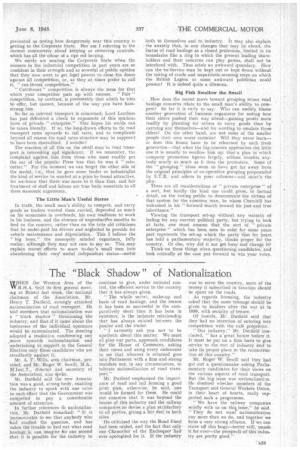The "Black Shadow of Nationalization
Page 25

If you've noticed an error in this article please click here to report it so we can fix it.
EN the' Western Area of the
R.A.A. held its first general meeting at Bristol last .week, the national chairman of: the Association, Mr, Henry T. Outfield, strongly attacked nationalization of road transport. He told members that nationalization was a " black shadow " threatening the industry, and that-if it came' about the businesses of the individual operators would be exterminated. The meeting adopted a resolution condemning any ,move towards nationalization and undertaking to support in the General Election only thosecandidates who are steadfastly against it.
Mr. A. F.. Wills, area chairman, presided, and Mr. Roger W. Sewill, M.A., 1W.Irist.T„ director and secretary of the Association, also ipoke.
Mr. Outfield said the new Association was a good, strong body, enabling the industry to speak with one voice to such effect that the Government was compelled to pay a considerable amount of attention.
. In further references tb nationalization, Mr. Outfield remarked: " It is inconceivable to'sue that anybody who had studied the question, and has taken the trouble to find out what road haulage is, can imagine for one second -that it is possible for the industry to
continue to give, under national control, the efficient service to the country that it has always given.
" The whole -sectet, make-up and basis of road haulage, and the reason -it has been so successful in the comparatively short time it 'has been in existence, is the intimate relationship that -has always existed between the haulier and the trader. , • • ' I earnestly ask you not to be apathetic about this matter. We muSt all play our parts„ approach candidates for the House of Commons, asking their views and using every endeavour to see that whoever is returned goes into Parliament 'with a firm and strong mandate not, in any circumstances, to tolerate nationalization of road trans.. port."
Mr. Outfield emphasized the importance of road and rail forming a good joint plan, otherwise, he said, one wotild be formed for them. He could not' conceive that it was 'beyond the brains of this industry and the railway companies to devise a plan satisfactory to all parties, giving a fair deal to both sides.
'He criticized the way the Road Fund had been raided, and the fact that only One Chancellor of the Exchequer 'had ever apologized for it. If the 'industry was to serve 'the country, more of the money it subscribed in taxation alionki be spent on the roads.
As regards licensing, the industry asked that the same tobnage shoUld be given to. habliers after the war al in 1939, with security of tenure.
Of hostels, Mr. Duffield said that they had no intention of entering into competition with the cafe prOprictor.
" Our industry," Mr. Outfield concluded, " has a-great future before it. It must be put on a firm bails to. give service to the rest of industry and to take its proper place in the reconstnicdon of this country."
Mr. Roger W. Sewill said they had got out a questionnaire asking Parliamentary Candidates for -their views on the various aspects of road transport. But the big issue was nationalization. He doubted whether members of the Transport arid General Workeis Union, in their heart of hearts, really supported such a programme, " We have the railway companies solidly with us on this issue;" he said. " They do not want nationalization any more than we do, and together we form a very strong alliance. If we can Stave off this bogy—better still, smaSh. it for ever—the prospects of. this industry are pretty good."




















































